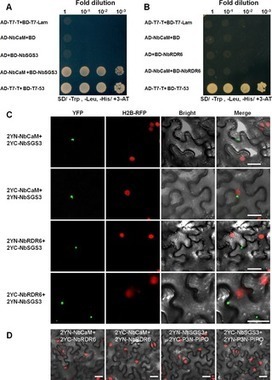A calmodulin-like protein suppresses RNA silencing and promotes geminivirus infection in Nicotiana benthamiana
Author summary Post-transcriptional gene silencing (PTGS) is an elaborately regulated process for defense against virus infection in plants. To achieve effective infection, a betasatellite molecule associated with geminivirus induced high levels of an endogenous RNA silencing suppressor, calmodulin-like protein (CaM), to counter host defenses. However, although CaM is one of the first identified cellular suppressors of RNA silencing, the mechanism of PTGS suppression is still poorly understood. This study demonstrates that CaM interacts with and degrades Suppressor of Gene Silencing 3 (SGS3) in Nicotiana benthamiana. We found that domains essential for the interaction between NbSGS3 and NbCaM are also required for the subcellular localization of NbSGS3 and for NbCaM suppressor activity. Moreover, NbCaM mediated NbSGS3 protein degradation can be blocked using the autophagy inhibitors 3-methyladenine and E64d, and by knock-down of key autophagy-related genes within the phosphatidylinositol 3-kinase (PI3K) complex. Silencing of the PI3K complex also inhibited geminivirus infection, which is consistent with autophagy playing an important role in RNA silencing suppression pathway and geminivirus infection.
A calmodulin-like protein suppresses RNA silencing and promotes geminivirus infection in Nicotiana benthamiana
Source: Virology News
